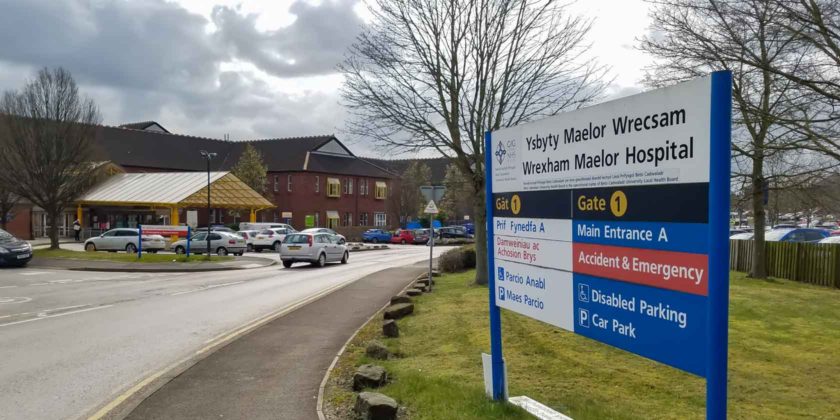Senedd: Betsi ‘nowhere close to seeing the improvements that we should be seeing after a year in special measures’

Progress at the troubled Betsi Cadwaladr University Health Board has been nowhere near good enough in the year since it was placed back into special measures, the Senedd heard.
Gareth Davies said the health board, which has been in and out of intervention since 2015, has spent longer in special measures than any other organisation in health service history.
Mr Davies, who worked for the health board for more than a decade before being elected, raised concerns about dire waiting times data and dreadful mental health performance.
Opening a Tory debate on February 21, he told the chamber: “We are nowhere close to seeing the improvements that we should be seeing after a year in special measures.”
The Vale of Clwyd MS advocated an independent inquiry into health care in north Wales, and a tuition fee refund to solve recruitment and retention issues.
Darren Millar, the Tory MS for Clwyd West, called for greater transparency as he criticised the health minister for “passing the buck” to the health board.
‘Enormous risks’
Janet Finch-Saunders warned that the health board continues to face huge issues.
The Aberconwy MS said a report released this week outlined enormous risks to patient safety, including oxygen cylinders not connected properly and severe backlogs in urology.
Sam Rowlands, the former Conservative leader of Conwy County Borough Council, criticised a Labour leadership debate between Vaughan Gething and Jeremy Miles held in Mold.
He told the Senedd that questions were filtered and not one was asked about the NHS.
Mark Isherwood, a fellow Tory MS for North Wales, accused Welsh ministers of dismissing and deriding evidence-based warnings about the health board over many years.
‘Critical criteria’
Llŷr Gruffydd, for Plaid Cymru, questioned the motive for taking the health board out of special measures just before the 2021 election only to later intervene again.
The North Wales MS welcomed a change in senior leadership and a more transparent tone under Dyfed Edwards and Carol Shillabeer as chair and chief executive respectively.
He applauded Mr Edwards for attending a public meeting about GPs, saying: “That wouldn’t have necessarily happened in the past … that was a breath of fresh air.”
Mr Gruffydd urged Welsh ministers to publish details of the de-escalation process, including who will be involved and an explanation of the decision.
“We’re a year into special measures and critical criteria aren’t in place,” he warned.
“Now, I know you’re probably waiting for the new board to be in place … but I think 12 months – a whole year – for us to be able to articulate what that looks like is unacceptable.”
‘Dysfunctionality’
His colleague Mabon ap Gwynfor accused the health minister of trying to micromanage the health board daily, hindering its ability to be innovative and flexible.
Calling for a long-term vision, he said: “Without this, I’m afraid we will be stumbling on from one crisis to another – with staff losing confidence and patients continuing to suffer.”
Jack Sargeant, a Labour backbencher, who represents Alyn and Deeside, welcomed a report by Wales’ auditor general on progress that has been made.
He echoed constituents’ frustrations about past failings on mental health services, access to GPs, waiting times and the “dysfunctionality” of the health board.
“It’s not been good enough,” he said. “All this and more is why the health board has gone in, out and then back into special measures – it’s clear the problems were deep-rooted.”
Mr Sargeant emphasised the importance of improving access and outcomes.
‘Right tracks’
Eluned Morgan, Wales’ health minister, argued the health board is on the right tracks with new leadership driving a change of culture.
She stressed she has no intention of de-escalating the health board until she is absolutely sure serious issues and drivers of poor performance have been resolved.
Baroness Morgan, who also gave an update on progress during a Senedd statement on February 20, told MSs the first phase has focused on the stability of the board.
“There are real signs, I think, that the health board is starting to change for the better,” she said, pointing to the de-escalation of vascular services and reduced waits for orthopaedics.
Baroness Morgan accepted people are still waiting too long to be seen in A&E, with significant improvement required in ambulance handover delays.
She said: “I recognise that there is a long way to go before we can restore the confidence, though, of many people in north Wales in relation to their health service.”
The Conservative motion and all amendments were voted down.
By Chris Haines, ICNN Senedd reporter
Spotted something? Got a story? Email: [email protected]
Latest News
